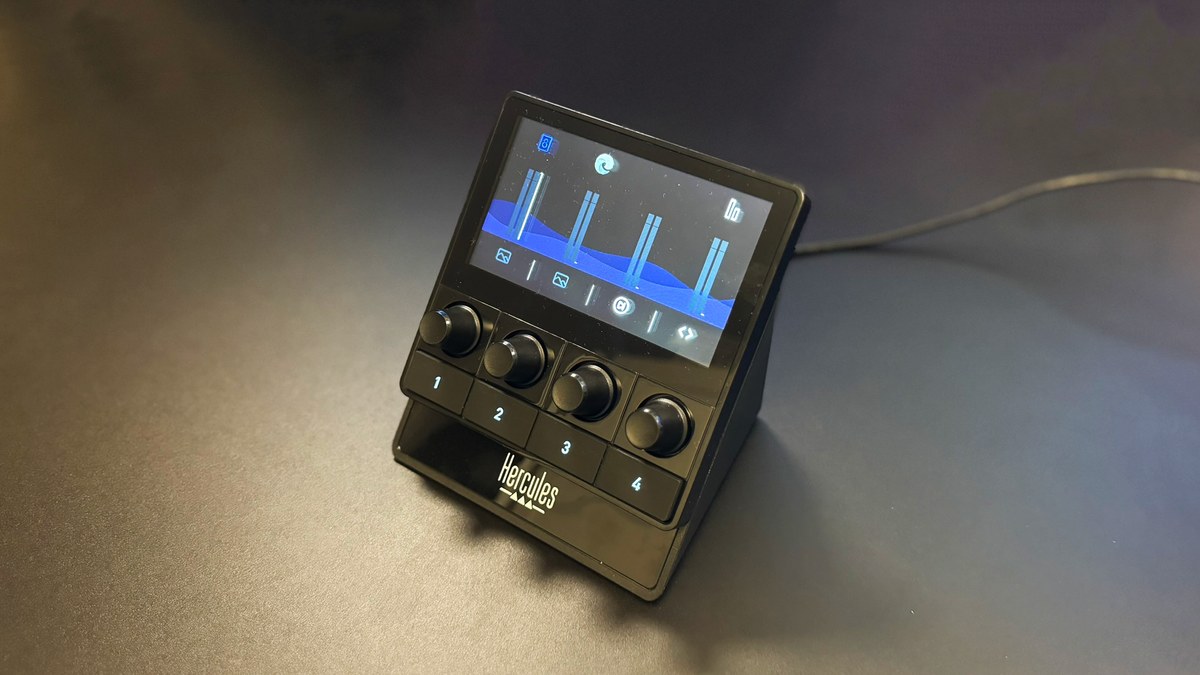12DOVE Verdict
Streaming mixers hardly ever feel like an exact science even the best brands get right all the time. Nonetheless, there are much better options out there if you're willing to spend a bit more. Average build quality, software limitations, and a few other issues let this audio interface down.
Pros
- +
Compact size
- +
Large LCD screen
- +
Solid basic control of audio sources
Cons
- -
Average build quality
- -
Can’t handle complex tasks
- -
Limited to just 2 pages of sources
- -
No external integrations
Why you can trust 12DOVE
Streams are famously noisy things and trying to keep everything in balance can often be a tricky boss to battle. From microphone levels to game sound and music, there’s a lot to contend with and many gamers will turn to a physical mixer for support.
With a range of favored brands like Razer, Rode, and Elgato in the market that already make the best capture cards and other streaming gadgets, Hercules is unlikely to be a name that quickly comes to mind. With a background in DJ equipment, Hercules has a history with audio, but the Stream 100 arrives as their first offering for home PC users.
A plug-and-play USB controller, the Stream 100 aims to simplify live stream audio management with a range of physical inputs and a dedicated LCD screen. A $149.99/£119.99 price tag makes this a cheaper choice than existing options but does it offer enough to be considered among some of the best streaming controllers and audio mixers?
Design & Features
Desktop real estate is often at a premium in-home streaming setups so the Hercules Stream 100’s relatively compact footprint is a welcome one. Despite its small size, it doesn’t feel cramped though and the generously sized 4.3” LCD screen and neatly spaced inputs all feel like they have their own room to work. The included USB-C cable also features a right-angle connection to keep it neatly tucked behind the unit which is a thoughtful touch.
Like almost all of the build, the Hercules Stream 100’s four dials are hard plastic with no grip texturing or rubberization. It’s a disappointing level of finish that leaves the unit feeling cheaper than it should, even at this more palatable price point than its XLR counterpart, the Hercules Stream 200 XLR. I also found a strange difference in resistance level across the four dials, each was already easier to twist than I would expect but some dials were even slacker than others.
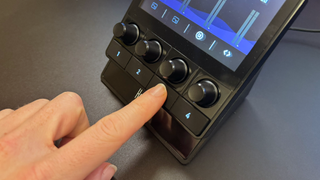
Things do improve when you interact with the buttons below however and almost make the dials feel worse in comparison. These are pleasant-feeling full rubber buttons that emit a satisfying click and have an alluring backlight. The force required to fire them off is just right and despite the quite large size, I had no issues with mis-clicks no matter which part of the button I prodded.
The Hercules Stream 100 is capped off by a 4.3” LCD screen that dominates the front of the unit. It’s bright and clear with enough detail for its purpose though smaller text does start to get a little rough around the edges. There’s no touch support here which is a shame as a screen of that size feels like it's crying out to be interacted with but the slightly more expensive BEACN Mix Create doesn’t feature one either so it’s far from an expectation.
My main concern with the design of the Hercules Stream 100 however is that it’s all a little bit empty. It’s noticeably light and even feels hollow to pick up, there’s nothing grand about it. Tapping on anything other than the rubberized buttons gives a horrible cavernous clack to remind you there’s not much going on in there. I wouldn’t usually advocate for sneaky tricks, but even if Hercules had filled the Stream 100 with a little concrete in a couple of places it would have massively improved the feel.
Performance
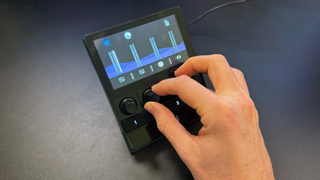
In testing, I found the Hercules Stream 100 a slightly curious device to use. What it can do, it does just fine and I don’t have any major complaints; the problem is it doesn’t quite do enough to become a solution worthy of investing £120 in. When you consider the cost of the best microphones for streaming and gaming, you want the best value you can get for any additional add-ons.
The goal of the Stream 100 is to help simplify the process of balancing your audio output, allowing for quick adjustments to individual inputs on the fly to keep everything in check. If your setup is simple with just a couple of consistent audio sources to manage, it’ll achieve this pretty well. Using the Stream Control app to assign individual sources to dials I was able to play with levels without diving into UI menus or tabbing out of a game.
All the while the LCD screen offered a visual indication of how the volume of each of my sources sat against each other and whether my microphone was actually picking up audio. You’re able to personalize the experience with a different background image, custom icons, and colors for individual sources as well as labels above the buttons; all of which worked well and were quick to change.
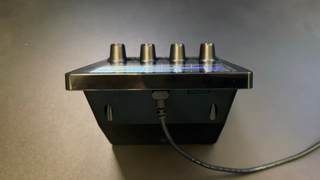
What the Stream 100 can’t do though is handle complex setups or split audio feeds between a personal mix for my speakers and a stream mix for my viewers. You’re also limited to just two pages of four inputs with no way to bundle sources together under common titles. The Stream Control app did make it simple to assign these sources and the list was comprehensive but the two-page limit feels needless given it’s handled on a software side only.
The four buttons are equally easy to assign to basic actions, but again, their functionality is limited. For things like muting and unmuting sources or launching an app they’re great but despite OBS integration their use as an Elgato Stream Deck+ alternative is minimal. You’ll also need to allocate a button to changing pages, so like the Razer Stream Controller X, you’re down a button already thanks to the software (six in total). There’s no external marketplace for additional plugins, dynamic swapping based on which app is running, or custom hotkey support. It all just feels a little undercooked.
Should you buy the Hercules Stream 100?
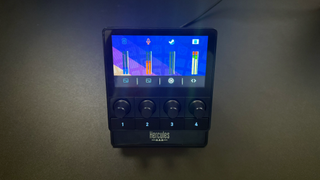
Ultimately, the Hercules Stream 100 is fine but fails to impress in most areas. For taking control of basic audio sources in a simple streaming setup it’ll do the job, but most creators are likely to quickly outgrow its capabilities. There’s no custom audio routing and the eight individual input limit is a peculiarly limiting one.
Some of this can be explained away by its reasonable £119.99/$149.99 price point as it sits below most competitors, but I still struggle to see the Stream 100 offering enough to become a valuable investment. For just a little bit more a device like the BEACN Mix or Stream Deck+ offers more functionality. Or you could save up and futureproof yourself by going for something made by a brand like Rode that specialises in this kind of gear. The sad part is, any of those alternatives would likely be a better bet for most streamers.
How we tested the Hercules Stream 100
I added the Hercules Stream 100 to my gaming PC and streaming setup for a week. Throughout testing, I used it to control audio levels both while live streaming on Twitch, and for day-to-day use, attempting to run my microphone and most audio sources through the app.
For more on how we test the latest content creation gadgets, take a look at our hardware policy.
Looking for more streaming gear? Take a look at the best webcams, the best ring lights for streamers, and the best green screens.
Alex is a streamer who has been creating gaming content for over a decade, streaming on Twitch regularly across the last five years. With a degree in film and a background in sports media, you'll find him jumping between 60,000 seat stadiums and his Animal Crossing island (where he's growing pears, in case you were wondering).

The Legend of Zelda movie and Sonic 4 are game for competition with both set for release a week apart

Gen V creator gives exciting update on second season of The Boys spin-off

Bill Murray regrets not working with one director in his illustrious career: “It’s one of the few regrets I have is that I didn’t do it."
